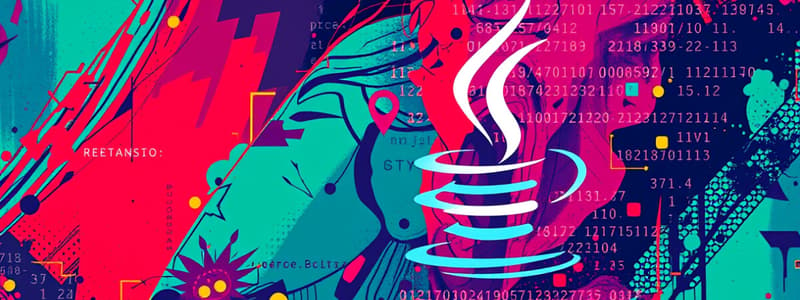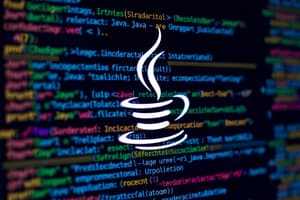Podcast
Questions and Answers
What does API stand for?
What does API stand for?
- Application Program Interface (correct)
- Automated Program Integration
- Advanced Programming Instruction
- Application Protocol Interface
What is an assembler?
What is an assembler?
A program that converts assembly language into machine language.
Define assembly language.
Define assembly language.
A low-level language created to ease the code writing.
What is a bit?
What is a bit?
What does a block in programming refer to?
What does a block in programming refer to?
What is a block comment?
What is a block comment?
What is a bus in computer architecture?
What is a bus in computer architecture?
Define byte.
Define byte.
What is bytecode?
What is bytecode?
What is the purpose of the Bytecode Verifier?
What is the purpose of the Bytecode Verifier?
What is a cable modem?
What is a cable modem?
What is a CPU?
What is a CPU?
What is the role of a class loader in Java?
What is the role of a class loader in Java?
Define a comment in programming.
Define a comment in programming.
What is a compiler?
What is a compiler?
What does DSL stand for?
What does DSL stand for?
What is an Integrated Development Environment (IDE)?
What is an Integrated Development Environment (IDE)?
What is an interpreter?
What is an interpreter?
What is a library in programming?
What is a library in programming?
What is a Java Development Toolkit (JDK)?
What is a Java Development Toolkit (JDK)?
Flashcards
Bit
Bit
The smallest unit of measurement in computing, represented by a binary digit (0 or 1).
API (Application Programming Interface)
API (Application Programming Interface)
A library of predefined classes and interfaces that provides a set of tools for building software applications in Java.
Assembly Language
Assembly Language
A low-level programming language that provides a more human-readable way to write code compared to machine language.
Assembler
Assembler
Signup and view all the flashcards
Byte
Byte
Signup and view all the flashcards
Bytecode
Bytecode
Signup and view all the flashcards
Bytecode Verifier
Bytecode Verifier
Signup and view all the flashcards
Class Loader
Class Loader
Signup and view all the flashcards
Compiler
Compiler
Signup and view all the flashcards
Java Command
Java Command
Signup and view all the flashcards
Java Language Specification
Java Language Specification
Signup and view all the flashcards
Cable Modem
Cable Modem
Signup and view all the flashcards
CPU (Central Processing Unit)
CPU (Central Processing Unit)
Signup and view all the flashcards
DSL (Digital Subscriber Line)
DSL (Digital Subscriber Line)
Signup and view all the flashcards
IDE (Integrated Development Environment)
IDE (Integrated Development Environment)
Signup and view all the flashcards
Interpreter
Interpreter
Signup and view all the flashcards
JDK (Java Development Toolkit)
JDK (Java Development Toolkit)
Signup and view all the flashcards
High-Level Language
High-Level Language
Signup and view all the flashcards
Keyword (Reserved Word)
Keyword (Reserved Word)
Signup and view all the flashcards
Library
Library
Signup and view all the flashcards
Block Comment
Block Comment
Signup and view all the flashcards
Comment
Comment
Signup and view all the flashcards
Line Comment
Line Comment
Signup and view all the flashcards
Dot Pitch
Dot Pitch
Signup and view all the flashcards
Encoding Scheme
Encoding Scheme
Signup and view all the flashcards
Study Notes
Programming and Computer Concepts
- Application Program Interface (API): A library of predefined classes and interfaces for Java program development.
- Assembler: Converts assembly language into machine language, enabling code execution.
- Assembly Language: A low-level programming language that simplifies code writing compared to machine language.
- Bit: The smallest unit of measurement in computing, represented by a binary digit (0 or 1).
- Byte: Comprises 8 bits and can represent one character of alphanumeric data.
- Bytecode: Similar to machine code but architecture-neutral, allowing execution across different platforms with a Java Virtual Machine (JVM).
Java Programming
- Bytecode Verifier: Validates bytecode to ensure it complies with Java's security settings.
- Class Loader: Dynamically loads Java classes into the JVM on demand, abstracting file systems from the runtime environment.
- Compiler: Transforms source code from a high-level programming language into a target language, typically object code for execution.
- Java Command: Facilitates command-based execution of Java programs.
- Java Language Specification: Defines the syntax and semantics of the Java programming language.
Computer Hardware and Connectivity
- Cable Modem: Utilizes a cable TV line for internet access, typically offering faster speeds than DSL.
- Central Processing Unit (CPU): The microprocessor component responsible for most data processing, consisting of a Control Unit and Arithmetic/Logic Unit.
- Digital Subscriber Line (DSL): A technology that transmits digital data for internet access over local telephone network wires.
Software Development Tools
- Integrated Development Environment (IDE): Comprehensive software for programming, including a source code editor, build automation tools, and debugger.
- Interpreter: Directly converts source code into machine code for execution without generating a separate binary file.
- Java Development Toolkit (JDK): Essential software package for developing and running Java applications.
Programming Language Characteristics
- High-Level Language: Offers abstraction from computer details, simplifying programming and often automating complex memory management tasks.
- Keyword (or reserved word): Special words within a programming language that hold specific meanings and cannot be repurposed.
- Library: Contains a collection of predefined classes and interfaces for software development, similar to an API.
Comments and Code Structure
- Block Comment: Used for multiline annotations in code, often enclosed in specific delimiters.
- Comment: Provides explanatory notes within code to enhance understanding and maintainability.
- Line Comment: Enables programmers to include brief explanatory notes using specific symbols.
Display Characteristics
- Dot Pitch: Measures the space between pixels on a display, with smaller distances leading to a sharper image quality.
Data Transmission and Encoding
- Encoding Scheme: Defines the rules for translating characters, numbers, and symbols into computer-readable data.
Studying That Suits You
Use AI to generate personalized quizzes and flashcards to suit your learning preferences.




